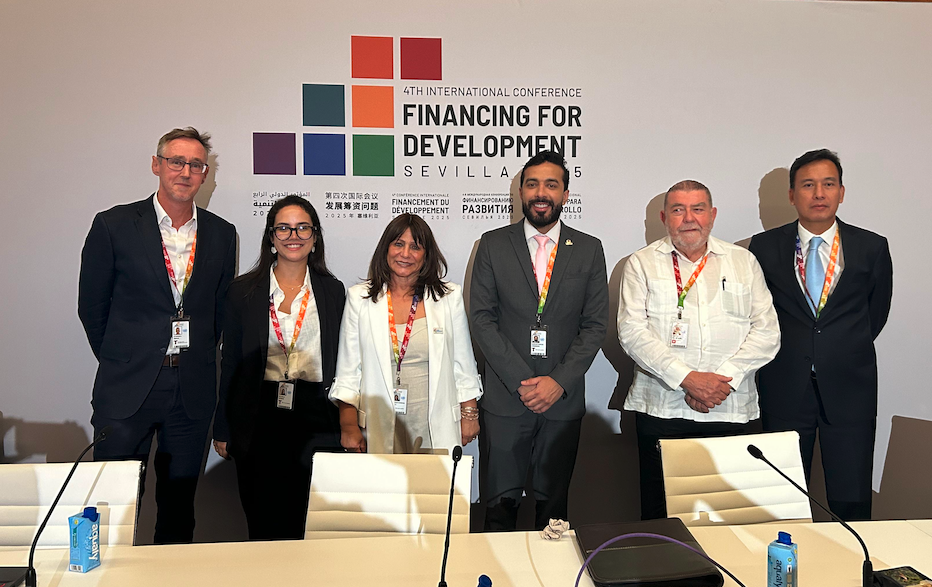
High-level authorities from Indonesia and São Tomé and Príncipe reiterated their commitment to sustainable financing strategies for school feeding programmes during the side event ‘Financing School Feeding as a Pillar for Ending Hunger, Building Resilience and Promoting Development’, held on 2 July as part of the UN meeting on sustainable financing in Seville (Spain).
The event was organized by the WFP Centre of Excellence against Hunger in Brazil, in partnership with the National Education Development Fund (FNDE) and the Brazilian Cooperation Agency (ABC).
Indonesia
Representing Indonesia, the Director for Economic Development and Environment at the Ministry of Foreign Affairs, Tri Purnajaya, presented the country’s ambitious plans to significantly increase investment in school feeding. The planned budget for the programme will rise from $10.5 billion in 2025 to $28 billion by 2029. Despite initial implementation challenges – with only 2.6 per cent of the annual budget disbursed by mid-2025 – the country is already making concrete progress.
Mr Purnajaya highlighted the importance of cooperation with the WFP, which has provided crucial technical support to the Indonesian government, especially in the formulation of nutrition-sensitive programmes, food security standards and public procurement mechanisms. He also highlighted the role of pilot experiences supported by the WFP in regions such as Nusa Tenggara Timur and Papua, which served as the basis for the national expansion of the programme.
Indonesia also showed interest in expanding partnerships to develop innovative financing instruments and knowledge-sharing platforms with other countries.
São Tomé and Príncipe
São Tomé and Príncipe was represented by the Minister of Foreign Affairs, Ilza Amado Vaz, who played an active role, even though she was not one of the event’s panellists. During the question-and-answer session with the audience, the minister shared her experiences of the National School Feeding and Health Programme (PNASE), considered a benchmark in West Africa. She highlighted the strong national political support for the programme and discussed the challenges of ensuring its long-term financial sustainability.
The minister also drew attention to the importance of adopting environmentally responsible strategies, such as the use of clean cooking technologies, in order to make school programmes more resilient to climate change. Ilza Amado Vaz reinforced the call for international cooperation to tackle these challenges and promote innovative and sustainable solutions.
Brazilian cooperation
During the event, Ambassador Ruy Pereira, Director of the Brazilian Cooperation Agency (ABC), highlighted the strong strategic partnership between the Government of Brazil and the WFP through the Centre of Excellence against Hunger in Brasilia. He emphasised Brazil’s role as a global reference in promoting school feeding, especially through cooperation with countries in Africa and Asia, based on the experience of the National School Feeding Programme (PNAE).
The ambassador pointed out that school feeding is a fundamental pillar for human development and reiterated that the issue is a priority for Brazil’s international cooperation. According to Ruy Pereira, the Brazilian model demonstrates that it is possible to build sustainable, nationwide public policies with a strong focus on family farming, food security and social inclusion.
The director of the FNDE, Anderson Sampaio Santos, presented the legal and institutional structure of the National School Feeding Programme (PNAE), which is fully funded by the federal government. ‘The PNAE guarantees intersectoral coordination, legal certainty and continuous resources,’ he emphasised. Anderson also pointed out that, by law, 30 per cent of the budget must go to family farming, which strengthens local food systems and boosts rural development.
Coalition
Among the panellists, Kevin Watkins, senior advisor to the Sustainable Financing Initiative (SFI) of the School Feeding Coalition, brought a broad perspective on school feeding as an instrument of social justice and national development. In his speech, he emphasized the connections between school feeding and areas such as education, health, agriculture and economic inclusion.
Watkins advocated greater political commitment and an intersectoral approach to ensure that school feeding programmes are integrated into national development strategies. He also shared concrete examples of countries that have managed to mobilize domestic resources and secure sustainable long-term funding for these initiatives.
FAO representative Najla Veloso also took part in the event, highlighting the role of the Sustainable School Feeding Network (RAES) in mobilising national resources for the sector.
The event was moderated by Leticia do Valle, Programme Officer at the WFP Centre of Excellence in Brazil, and featured the virtual participation of the Dominican Republic’s Director of Health and Nutrition, Ana Carolina Baez. The session reinforced the relevance of South-South cooperation and the role of the Centre of Excellence in disseminating good practices based on the Brazilian model of the National School Feeding Programme (PNAE).




